Featured Topics
Featured Products
Events
S&P Global Offerings
Featured Topics
Featured Products
Events
S&P Global Offerings
Featured Topics
Featured Products
Events
S&P Global Offerings
Featured Topics
Featured Products
Events
Financial and Market intelligence
Fundamental & Alternative Datasets
Government & Defense
Professional Services
Banking & Capital Markets
Economy & Finance
Energy Transition & Sustainability
Technology & Innovation
Podcasts & Newsletters
Financial and Market intelligence
Fundamental & Alternative Datasets
Government & Defense
Professional Services
Banking & Capital Markets
Economy & Finance
Energy Transition & Sustainability
Technology & Innovation
Podcasts & Newsletters
16 Feb, 2022
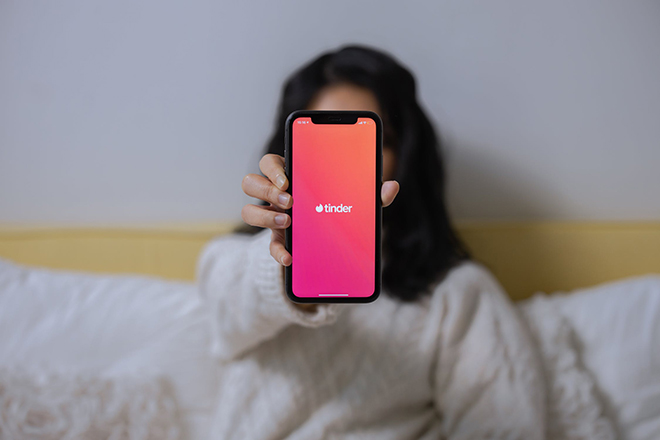
|
Analysts have reported mixed reviews for dating platforms as they work to capture more revenue from users. |
Popular dating apps found love from users during the pandemic, but data and analyst commentary indicate that in order to keep growing, dating platforms will have to find new ways to innovate as COVID-19 themes unravel.
When global lockdown conditions set in early in 2020, people were unable to meet and interact with others directly for dates or flings. Trapped in their homes, singles eventually started looking to their phones to find potential partners, benefiting big-name dating companies, notably Bumble Inc. and Match Group Inc., owner of apps like Tinder, OkCupid and Hinge. More recently, however, that growth has fallen off, leaving companies looking for new ways to drive new users and upgrades.
Fishing for new users
Between the first quarter of 2020 and the second quarter of 2021, Bumble grew its paying users from 2.2 million to 2.9 million. Growth stalled, however, in the third quarter, with paying users remaining flat quarter over quarter.
Apps like Bumble, Tinder and Hinge offer a basic free service for users to swipe right on — or "like" — a prospective date. But the apps try to convert free users to paying ones by limiting the number of swipes on the free tier.
Bumble, for instance, gives users an undefined swipe limit in order to encourage more thoughtful use of available swipes. When a user runs dry, they are prompted to upgrade to a Boost or Premium offering that gives them unlimited likes and other features. Hinge limits users to eight likes per day and then prompts users to upgrade to a subscription version of the platform.
Like Bumble, Match saw strong growth through the early stages of the pandemic, adding 3.3 million total paying users between the first quarter of 2020 and the third quarter of 2021. In the fourth quarter of 2021, however, the company lost paying users on a sequential basis, dropping from 16.3 million to 16.2 million.
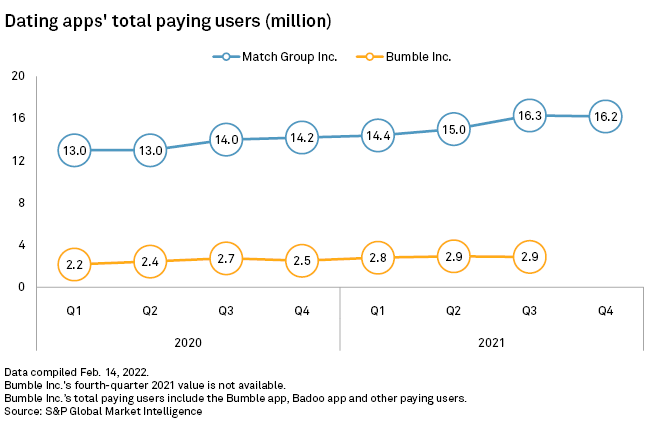
Love in the time of COVID
"We're not back to normal," Match CFO and COO Gary Swidler said on a Feb. 2 fourth-quarter earnings call. "We're not seeing the strength in new users yet. And so that is affecting the business everywhere."
The negative impacts from omicron should continue to be a factor in the first quarter, the executive said.
Still, executives see opportunities for long-term growth as online dating gains wider acceptance in society.
In North America and Europe, 44% of all singles had used dating products in 2021, compared to 34% in 2015, according to Match. The number of apps those singles had used grew to 3.6 from 2.0 during that time period.
"As people become increasingly comfortable with leveraging technology to interact with others and as more users have seen the value proposition that online dating offers ... we believe there is ample runway," Bumble CEO Whitney Wolfe Herd said on a recent earnings call. "And online dating is not a zero-sum game, with most users on multiple apps at any given time. So this long tail of secular growth."
Fighting for share
Analysts believe some apps are better positioned than others to convert free users to paying ones. Hinge, for instance, is expected to be a revenue driver for Match in 2022 and 2023 because Hinge's user base is highly under-monetized, according to Jefferies analysts Brent Thill and James Heaney.
In-app-purchase, or IAP, revenue data from Apptopia shows that Hinge has seemingly been taking share from its sister app Tinder in recent quarters. U.S. IAP revenue for Hinge rose from $2.3 million in the first quarter of 2019 to $15.0 million in the fourth quarter of 2021, while Tinder's U.S. IAP revenue shrank from $71.9 million to $56.6 million over the same period.
The same trend could also be seen globally.
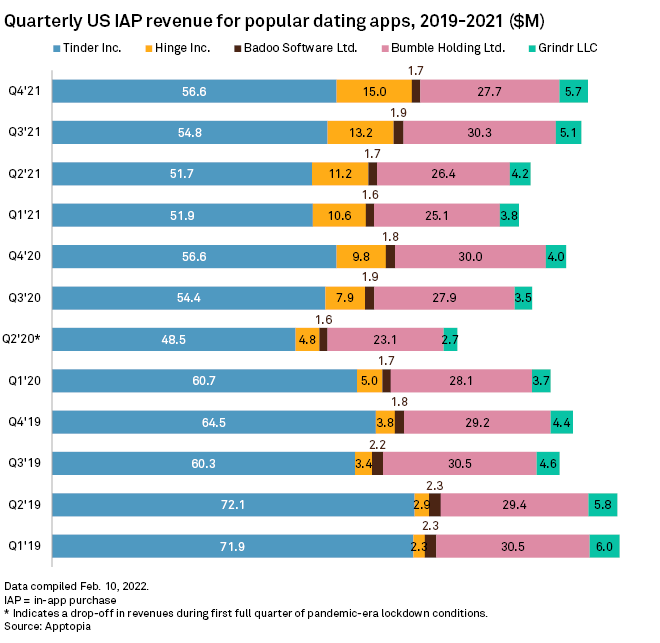
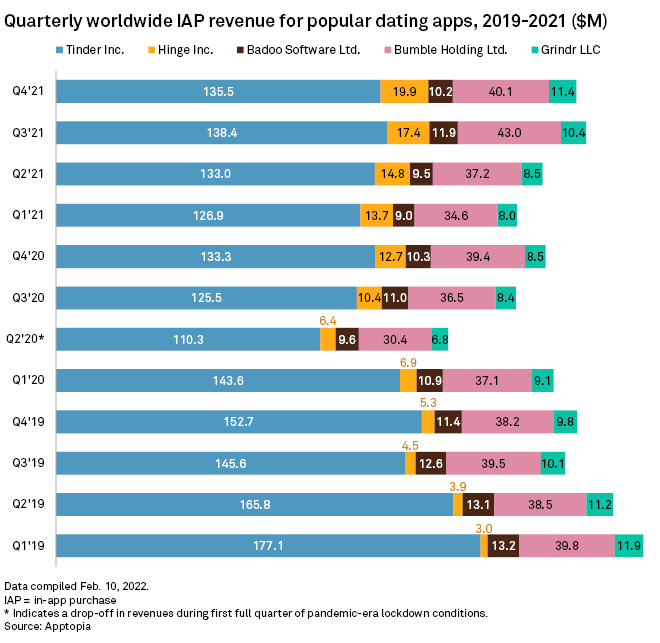
Swiping left
Still, some analysts are choosing to "swipe left" on dating app owners in general. Ford Equity Research assigned Match an "average" rating in a Feb. 4 note, saying that Match has slow earnings momentum given its downturn in EPS numbers.
Neither Match nor Bumble are strong investments at this point in the cycle, according to quantitative analysis firm CFRA. It gave Match a "hold" rating with negative readings on both valuation and growth. Bumble landed as a "strong sell" at CFRA.
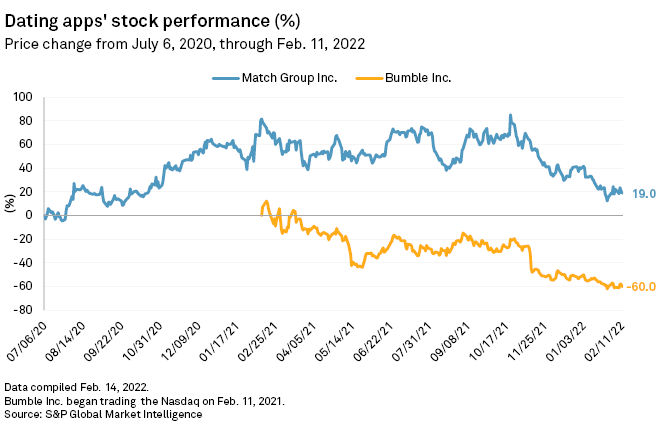
The darker side to online dating
One growing risk for these firms is the hefty rise in online love and fling enablement scams over the past two years. The Federal Trade Commission on Feb. 10 reported that romance scams hit an all-time high in 2021, costing victims of scams $547 million for the year.
Many people who have experienced scams reported being contacted on dating apps, the FTC said, though some instances occur in social media messages. The scammers manipulate users to transfer money.
App owners will need need to work harder to curtail the presence of fake accounts, or they risk losing users who were left not just with a broken heart but also an empty wallet.